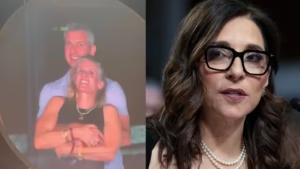When business meets music, sometimes the most unexpected drama unfolds. The recent Coldplay concert in Los Angeles became the stage for a corporate scandal that has everyone talking. Andy Byron, the CEO of a major technology company, found himself in hot water after being spotted at the concert with someone who wasn’t his wife.
The person in question? Kristin Cabot, a newly hired executive whom Byron had publicly praised as “exceptional” during her hiring announcement just weeks earlier. The timing of their appearance together has raised eyebrows across the business community.
Byron’s Glowing Endorsement Comes Back to Haunt Him
Corporate hiring announcements rarely make headlines, but Byron’s enthusiastic words about Cabot’s appointment now seem particularly telling. During the official announcement, Byron described Cabot as “an exceptional leader who brings fresh perspectives and innovative solutions to our team.” He went on to praise her “remarkable track record” and “unique ability to drive results.”
These glowing words have taken on new meaning following the concert incident. Company insiders report that Byron’s praise for Cabot went beyond typical corporate speak. He personally championed her hiring and ensured she received a compensation package that exceeded industry standards for similar roles.
The Coldplay Concert: A Public Display
Concert-goers at the Coldplay show couldn’t help but notice the chemistry between Byron and Cabot. Multiple witnesses reported seeing them sharing intimate moments during the performance. They were spotted holding hands, sharing drinks, and appearing particularly close during the band’s most romantic songs.
What makes this situation more complicated is that Byron has been married for fifteen years and has two children. His wife, Sarah Byron, is well-known in their social circles and has been a constant presence at company events. The contrast between his public family image and his behavior at the concert has created a significant buzz.
Company Response and Damage Control
The company’s public relations team has been working overtime to address the situation. Initial statements emphasized that both Byron and Cabot are “dedicated professionals focused on advancing the company’s mission.” However, these carefully crafted words have done little to quell the speculation.
Key Details That Matter:
- Byron personally recruited Cabot from a competitor
- Her salary package exceeded typical ranges for the position
- Company policies regarding executive relationships remain unclear
- Stock prices have remained stable despite the controversy
The timing of events has created additional scrutiny. Cabot started her position only three months ago, yet she already has significant influence within the organization. Her rapid rise and Byron’s vocal support now appear in a different light.
Industry Reactions and Implications
Business analysts are watching this situation closely. Corporate governance experts point out that executive relationships can create conflicts of interest, particularly when one person has authority over another’s career advancement. The question becomes whether Byron’s professional judgment regarding Cabot was compromised by personal feelings.
Meanwhile, competitors are taking notice. Several industry publications have reached out for comment, though most officials have remained diplomatically silent. The technology sector has seen similar scandals before, and the outcomes are rarely positive for the executives involved.
The Broader Context of Executive Accountability
This incident highlights larger questions about executive behavior and corporate culture. When leaders make hiring decisions, their motivations should be purely professional. The appearance of impropriety can damage not only individual reputations but also company credibility.
Byron’s situation demonstrates how quickly personal choices can become public relations nightmares. Social media has amplified the story, with concert footage and photos circulating widely. The digital age makes it nearly impossible for public figures to maintain privacy during personal moments.
Moving Forward: What Happens Next
The company board will likely address this situation during their next meeting. Corporate governance standards typically require transparency regarding executive relationships, especially when they involve direct reporting structures. Byron may face pressure to recuse himself from decisions affecting Cabot’s career.
For Cabot, the situation presents unique challenges. Her professional reputation is now intertwined with personal speculation. Despite her qualifications, questions about her hiring and rapid advancement will likely persist.
The technology industry has established precedents for handling similar situations. Some companies have implemented strict policies regarding executive relationships, while others focus on disclosure and management of potential conflicts.
Final Thoughts on Professional Boundaries
This Coldplay concert incident serves as a reminder that executive actions extend beyond boardrooms and office buildings. Byron’s enthusiastic praise for Cabot’s hiring now appears in a different context, raising questions about the intersection of personal and professional relationships in corporate settings.
The situation continues to evolve, and its ultimate resolution will likely influence how other companies approach similar challenges. For now, both Byron and Cabot must navigate the complex terrain of public scrutiny while maintaining their professional responsibilities.
Corporate America will be watching closely to see how this story unfolds and what lessons emerge from the intersection of business judgment and personal relationships.








Be First to Comment